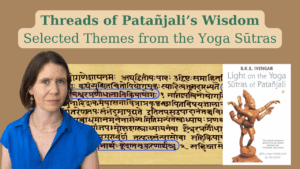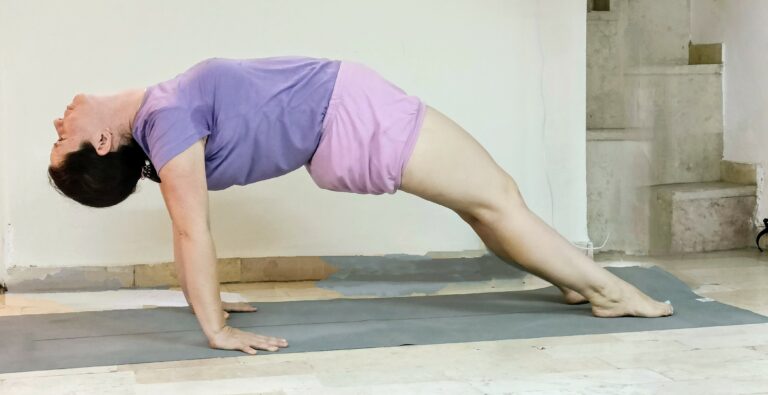
Threads in Patañjali’s Wisdom
Thank you for registering for Threads in Patanjali’s Wisdom online course with Dr. Agi Wittich This page contains everything you need for eight weeks

The recent mindfulness research from the Open University resonates deeply with the principles and practices of Iyengar Yoga. B.K.S. Iyengar’s approach to yoga has always emphasized the development of awareness and presence – qualities that lie at the heart of mindfulness practice. This alignment between modern research findings and traditional yoga wisdom offers valuable insights for practitioners and teachers alike.
In Iyengar Yoga, every pose becomes an opportunity for mindful awareness. The method’s characteristic precision and attention to detail naturally cultivate the same focused attention that mindfulness research identifies as beneficial for mental well-being. When we adjust a foot position, observe the relationship between different body parts, or maintain awareness of our breath, we are practicing mindfulness in motion.
The research’s findings about enhanced focus and cognitive function parallel Iyengar’s teachings about the mental benefits of precise asana practice. In his book “Light on Life,” Iyengar explains how detailed attention in poses develops concentration and mental clarity. This aligns perfectly with the research’s observations about improved attention and cognitive performance through mindfulness practices.
Iyengar Yoga’s use of props offers a unique perspective on mindful awareness. When we use props, we’re not just making poses accessible; we’re creating opportunities for deeper awareness and presence. The tactile feedback from props provides concrete anchor points for attention, similar to how mindfulness practices often use physical sensations as focus points for meditation.
The research’s emphasis on non-judgmental awareness finds a natural home in Iyengar Yoga’s approach to practice. While the method is known for its emphasis on precision, this precision serves as a gateway to self-awareness rather than self-criticism. Students learn to observe their bodies and minds with curiosity rather than judgment, developing the same kind of accepting awareness that mindfulness research identifies as crucial for mental health.
The study’s findings about stress reduction and emotional regulation reflect what many Iyengar practitioners experience through regular practice. The methodical approach to asana, combined with careful attention to breath and body awareness, creates an environment where practitioners can observe and regulate their stress responses. The emphasis on proper alignment and mindful movement naturally brings attention to areas of tension, allowing for conscious release and relaxation.
Particularly relevant to Iyengar Yoga is the research’s finding about building psychological resilience. The method’s progressive approach, where students gradually build strength and capability, naturally develops both physical and mental resilience. The practice of holding poses while maintaining awareness builds not just physical stamina but mental endurance as well.
In trauma-informed Iyengar classes, the connection between mindfulness and yoga becomes even more apparent. The research’s insights about managing anxiety and stress through mindful awareness align perfectly with how these specialized classes use precise, props-supported practice to help students develop greater body awareness and emotional regulation.
The research validates what Iyengar teachers have long observed: regular practice creates lasting changes in how students relate to their bodies and minds. Just as mindfulness practice develops the ability to observe thoughts without becoming caught up in them, Iyengar Yoga develops the capacity to observe physical sensations and mental states with greater clarity and less reactivity.
For Iyengar practitioners looking to enhance their practice with these research insights, consider:
The synthesis of this mindfulness research with Iyengar Yoga principles offers a powerful framework for understanding how our practice supports mental well-being. It reminds us that every adjustment, every moment of attention to alignment, and every conscious breath is an opportunity for mindful awareness and psychological growth.
Soons, I., Brouwers, A., & Tomic, W. (2010). An experimental study of the psychological impact of a Mindfulness-Based Stress Reduction Program on highly sensitive persons. Europe’s Journal of Psychology, 6(4), 148-169.

Thank you for registering for Threads in Patanjali’s Wisdom online course with Dr. Agi Wittich This page contains everything you need for eight weeks

Session 3 – Threads in Patañjali’s Wisdom For Session 4: Āsana as a Path to Samādhi We explore Patañjali’s teaching on āsana, and more
Agi Wittich is a yoga practitioner since two decades, and is a certified Iyengar Yoga teacher. Wittich studied Sanskrit and Tamil at the Hebrew University of Jerusalem, Israel, completing a PhD with a focus on Hinduism, Yoga, and Gender. She has published academic papers exploring topics such as Iyengar yoga and women, the effects of Western media on the image of yoga, and an analysis of the Thirumanthiram yoga text.